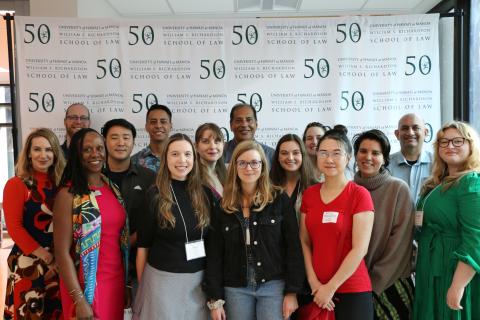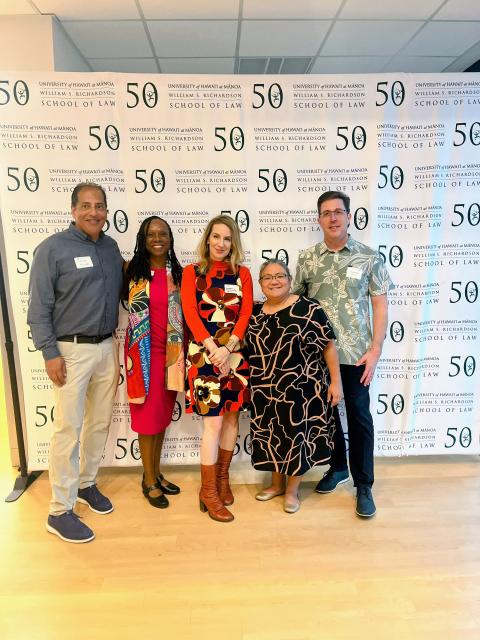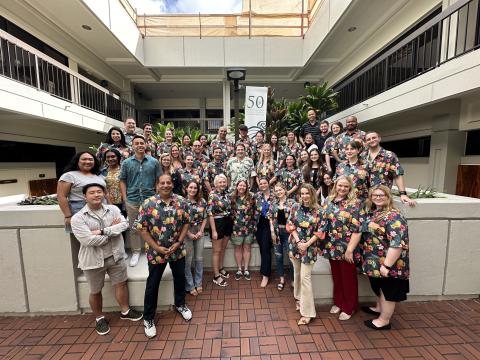Hawaii Intersession Represents Innovative Collaboration

Carpenter, Nelson, Minhas and UNH Franklin Pierce students and staff (Photo credits: Frankie Marullo)
Despite a distance of approximately 5,000 miles — with an ocean in the middle — the deans of the University of New Hampshire Franklin Pierce School of Law and the University of Hawaiʻi at Mānoa William S. Richardson School of Law (UH) were determined to find a way to work together.
During a January intersession, 30 students from UNH Franklin Pierce traveled to Honolulu to join a similarly sized cohort from UH to launch a partnership with their Hawaiian counterparts that both schools hope will continue into the future. From Jan. 8 to 12, the cohort participated in the Intellectual Property, Entrepreneurship, and Indigenous Community Development class, led by UNHFP Dean Megan Carpenter and Executive Director of the Franklin Pierce Center for Intellectual Property Micky Minhas. The intersession course was open to both residential and non-residential JD students as well as master’s students at UNH Franklin Pierce.
“By teaming up on this course,” Carpenter says of the collaboration with UH Law School and Dean Camille Nelson, “we demonstrated that, no matter how far apart law schools are, it is possible to collaborate in a way that benefits both groups of students. Our strength in intellectual property combined with the strength in social justice and indigenous studies at the University of Hawaii created a path-breaking curriculum that exposed the students to new ways of thinking.”

From Left to Right: Minhas, UH Law School Dean Camille Nelson, Carpenter, UH Law School Interim Associate Dean of Student Services Trisha Nakamura and UH Law School Associate Dean for Academic Affairs Nick Mirkay
The course covered many topics in IP law, including design, trademark, copyright, entrepreneurship, and the philosophical differences in how IP is used to protect indigenous knowledge. “By the end of the semester,” the syllabus states, “students taking this course should have an overview of western IP systems, as well as the principles of native IP systems.”
“The indigenous Hawaiian population had — and has — notions of intellectual property protection that is more community orientated, a very different philosophical basis than that of western IP systems,” Minhas explains. “In this class, we wanted to ground both sets of students on the fundamentals of IP protection in western IP systems and in indigenous populations, and then explore how entrepreneurs in indigenous communities could weigh the pros/cons of each system to meet their goals.”
In addition to Minhas and Carpenter, students also heard from experts from UH and the Oʻahu legal community, and the two schools worked together to bring in speakers from the World Intellectual Property Organization in Geneva to explain how other indigenous populations around the globe tackle the same issue.
“The on-location class enhanced the learning experience because we were immersed in the culture of the native Hawaiians,” says Anna D’Lima, a hybrid JD student scheduled to graduate in 2024. “From the field trip to Purple Mai’a — a grassroots incubator “on a mission to educate and empower culturally engaged, community-oriented, technology makers and problem solvers” — to learning that native Hawaiians do not share the same protections as Native Americans (e.g., land ownership), are two of many opportunities that future intellectual property lawyers have to make a positive impact in the lives of others.”
In an article on the Richardson Law website, UH Law Dean Nelson pointed to the camaraderie and connections made during the four-day course in Hawaii. “This was a great opportunity to work together,” she said. “It highlights the ability of law schools to cooperate and collaborate, as opposed to competing, to best serve our students.”

The Hawaii intersession was most recent example of UNH Franklin Pierce creating opportunities for its students to learn in context. In June, the law school will host world leaders in academia, industry, and private practice in Concord for the IP Summer Institute. There, students will learn alongside lawyers from around the globe on topics ranging from artificial intelligence to pharmaceutical patents to fashion law to IP tax. Later in the summer, UNHFP students will be immersed in the world of biotech and innovation in Boston. Then, in October, a group of students from the law school will travel to the eastern district of Texas for a first-hand look at patent litigation.
“At Franklin Pierce, we take students across the country to learn from leaders in industry, private practice, and academia,” Carpenter says. “[The Hawaii intersession] is the first time we have teamed up with another law school to bring those same opportunities to their students. We are committed to transforming legal education nationwide, and look forward to more collaborations with other law schools in the future.”